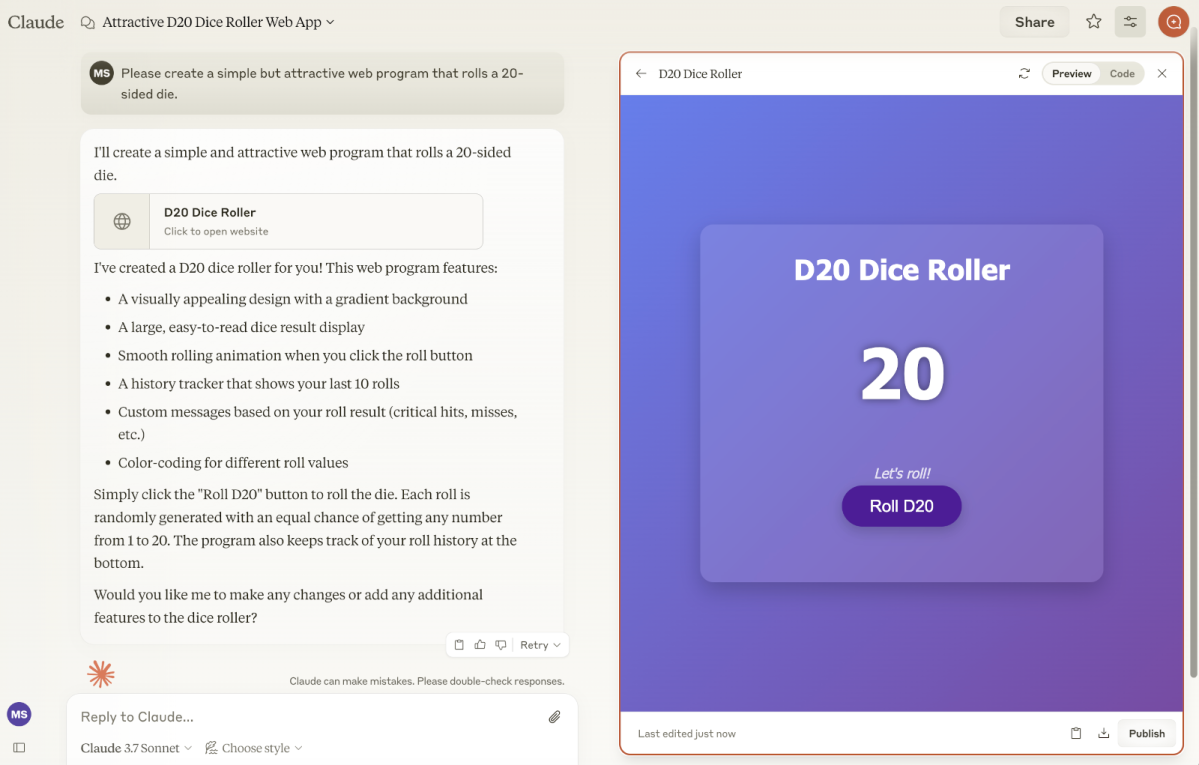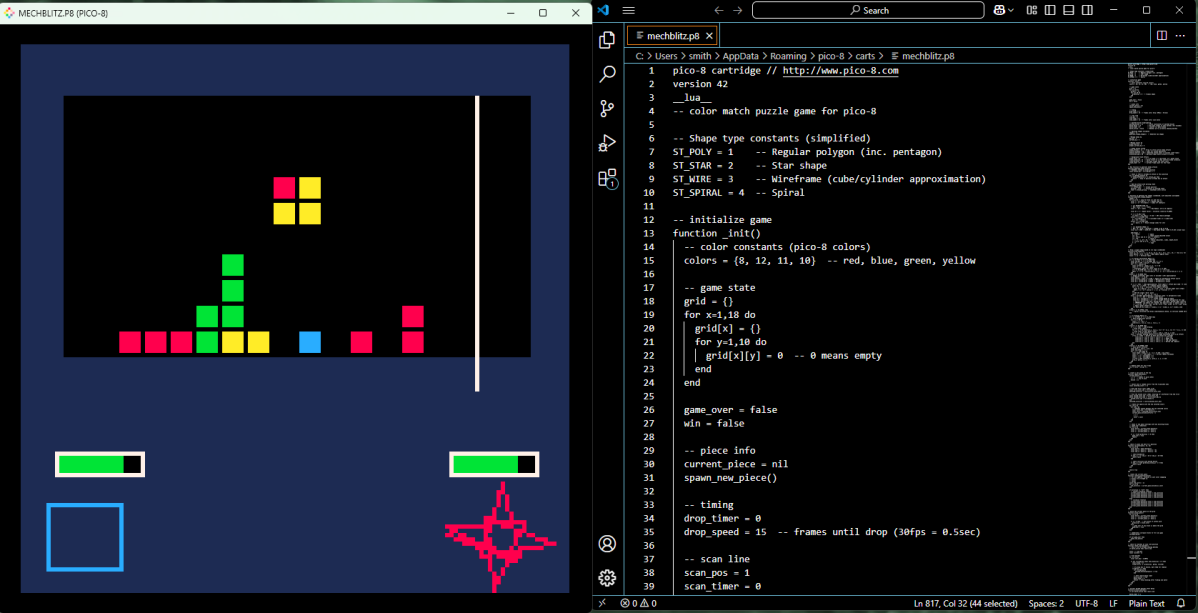On February 2nd, 2025, computer scientist and OpenAI co-founder Andrej Karpathy made a flippant tweet that launched a new phrase into the internet’s collective consciousness. He posted that he’d “fully given into the vibes” when programming with AI assistance.
The tweet of course kicked off a flame war, because that’s how X works, especially under the current management. But for me, the tweet hit home—because it perfectly describes how I use AI to code.
My experience with vibe coding
I’ve always had an interest in programming, because I’ve always had an interest in computers. I put together websites in HTML as a teenager (which, yes, were hosted on GeoCities) and have been occasionally dabbling in Python since.
Yet none of my projects got very far and, apart from my early websites, I never made anything useful. My efforts all followed a familiar pattern: I’d fixate on a particular resource—like an O’Reilly book or an online course—and get started with great enthusiasm, but as I’d realize I was months or years away from creating anything remotely useful, I’d give up.

Matt Smith / Foundry
That changed in late 2024 when my general frustration with WordPress, which I was using for my personal website, got the better of me. In a fit, I threw my website’s content plus a screenshot of it into Claude 3.5 Sonnet and asked the AI to replicate my site with HTML, CSS, and JavaScript. To my amazement, Claude 3.5 generated a functional website. It wasn’t perfect, but after a couple hours of working with Claude, I wound up with a website I liked even better than its WordPress predecessor.
My approach was exactly what Karpathy described. I didn’t read the code, nor did I really try to understand it (though I did have to think a bit about how the featured articles carousel works). That aside, I just told Claude what to do, copy-and-pasted the results in VSCode, saved the file, and reloaded my browser to see what changed. And it worked.

Matt Smith / Foundry
But the most important part? It was fun! Fun enough that I’ve since tried my hand at several other coding projects. I made an online tool to track initiative and roll dice when DMing tabletop roleplaying games, I made another tool to simplify rolling dice in Battletech, and I’m currently making a puzzle game for the Pico-8 virtual game console. I also used AI to guide me through setting up tools that require a bit of fussing, like OpenAI’s Whisper speech-to-text model.
Notably, all three projects were in different programming languages—HTML/JavaScript, Python, and Lua—none of which I’m even remotely proficient with. I’ve also dabbled in some C#, as I started to make the puzzle game in Unity before deciding it was overbuilt for my needs and swapping to Pico-8. I also toyed with turning my tabletop RPG tool into a Windows app before deciding that wasn’t helpful.
The risks and pitfalls of vibe coding
So, yeah, I’m vibing. But is it all good vibes? Or does vibe coding herald the same kind of AI slop-driven era for software as we’re seeing for blogs, forums, artwork, video, and music? That’s the big fear of critics, and it’s easy to understand those fears.
Karpathy’s “vibe coding” is fast, fun, and approachable, but it isn’t rigorous, detail-oriented, or careful. The code written by AI will often work, but it can contain flaws that aren’t immediately obvious—and that raises an obvious question: how does a know-nothing programmer spot bugs and security flaws in AI-generated code?
The simple answer is… they can’t.
Take the case of Leonel Acevedo—better known as just “leo”—who posted about his experience vibe coding a SaaS startup, only to find himself dealing with major issues like unsecured API keys. It led to hundreds of videos and social media posts dunking on Leo’s naïveté:
To be clear, I don’t have much sympathy for Leo. He used social media to promote his business with posts clearly built to drive engagement. And, well, that’s how chasing influence on social media works. Sometimes you’re the hero and sometimes you’re the villain. (Predictably, Leo is already making content about “rebuilding my SaaS in 30 days.”)
Yet, I question what his problems are supposed to prove. Is vibe coding a SaaS and going straight into production dumb? Sure. But are most people vibe coding a SaaS startup and flinging it into the world like
The reality is a lot more practical. Some people, like me, see vibe coding as a fun way to tackle simple projects that were previously out of reach. Others, including many software engineers, will use it as way to build prototypes, demonstrate proofs of concept, and—yes!—learn.
It’s the blogging revolution… for code
In a strange way, vibe coding reminds me of the circumstances from decades ago that paved the way for me to become a tech journalist.
I grew up in a small midwestern town. My high school was so small, we didn’t even have a school newspaper. Then I went to college and got a degree… in English Literature. Not journalism or communications. I never wrote for the college paper, either. I then graduated college with no useful contacts or work experience.
But I lucked out. I graduated right when the blogsphere exploded and social media took over the internet. Suddenly, formal credentials and an industry-specific degree, though helpful, weren’t necessary. So, I started writing—and eventually publications started paying me for it. I’ve been doing this now for 17 years.
To me, vibe coding looks like it will do something similar for future software engineers and the programming landscape. Forget formal training. With AI assistance, people who are interested in programming don’t even need informal training. Anyone who knows their way around a laptop can ask ChatGPT about the tools they need to get started, how to install them and get them working, and generate the very code they need to get the first version of their project up and running.
These people will make mistakes. A lot of the code generated will be bad, or at least inelegant. People will lose projects because they encounter a bug they can’t fix. The AI-generated code in my own projects is enough to make a senior software engineer go blind, I’m sure.
But if it opens programming a bit wider to people (like me) who otherwise lack the patience to spend six months reading an O’Reilly tome just to spin up a halfway decent Python program, well, that seems like a win.
Further reading: I spent $200/mo on ChatGPT Pro so you don’t have to. Here’s what I found and whether it’s worth it
Zaloguj się, aby dodać komentarz
Inne posty w tej grupie

The Philips Hue app has grown in complexity over the past several yea

Though the Steam Deck has been imitated by major PC industry players

A senior Intel executive said Tuesday that Intel has begun building m

The best way to ensure your laptop never dies on you—whether you’re w

Just having a password set on your PC in Windows 11 isn’t a sure way

Okay, bargain hunters, settle in. This is probably the best deal I’ve

Is your mouse suddenly registering two clicks even though you swear y
